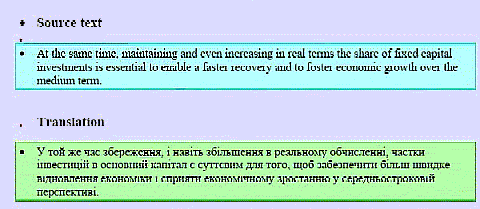|
Assessment of Needs
|
| Purpose | Solution |
| To give (or get) the general idea of a document | - Consider producing a shorter text for translation. Decide which information is actually required and translate only such information. Use word-free images, diagrams, and maps where possible. - Consider using machine translation. It provides the rough translation of texts to get the gist of them. For this purpose, language translation software is used. - Try a do-it-yourself approach. It may work well if you understand a target language because you have learned it or spent a lot of time in the country where it is spoken. Dictionaries will help to accomplish the task. |
| To inform. You want to get (or provide) clear and complete information | Translation of the "for-information" quality. For example, it is good for personal letters and for official documents with limited circulation. Foreign language translation of the "for-information" quality is accurate; however, the style of it may be unpolished and the vocabulary not perfect. It may have minor mistakes in syntax and punctuation. Consider an option to translate into one language instead of several. For example, Russian was a language common to all Former Soviet Union (FSU) republics for 70 years. It is still understood and spoken in these territories. If the FSU is your target market, translate text only into Russian instead of translating into Russian plus languages of the FSU republics. If you are not sure into which language your document should be translated, a map of languages of the world can help you to make the right choice. Who can provide this translation quality: |
| To advertise, to sell. Cases when your corporate image or legal liability is a top priority | Translation of the "for-publication" quality. This category includes, inter alia, web site translation, translation of user manuals, clinical study protocols, sales brochures, voice-overs, contracts and financial reports. As a rule, foreign language translation of the "for-publication" quality is natural-sounding, free of objective errors and mistranslations. It is characterized by appropriate word choices and good vocabulary. Furthermore, it is culturally appropriate for the foreign community being served because such translation is a means not only of linguistic communication, but of cross cultural communication too. Respecting the culture of your foreign audience or business partner is of paramount importance. Culture Briefings can provide you in-depth information about culture and customs of people in other countries. Who can provide this translation quality: |
Didn't find what you were looking for? Use this search feature to find it.
Link to Parter Site:
Professional Secretarial Services
Guidelines, tips and tools about translation, career issues, writing a letter, resume or meeting minutes and organizing travel. Information, tips examples and much more make it easy to achieve your goal, whether you are a professional secretary, a manager, or just a private person.
Return from Assessment of Needs in Foreign Language Translation to Home Page
_____________________________________________________________________ Website owner: Irina Lychak, self-employed freelance linguist, Russian translator, Ukrainian translator, Kiev (Kyiv), Ukraine
Not happy with the rates you pay for professional translation? Look for cheaper ways to translate your websites, blogs and articles? Try this translation software. Even though high-quality, professional translation is rather expensive and takes time to do. If you have neither enough time nor money to spend on professional translators, but are still interested in translation of your website or blog and quality is not of utmost importance to you, check if this software can help you. Would you like to build a solid, long-term future for yourself? If yes, keep on reading. Building an online business as a source of extra income was my long-standing dream. I tried two free and one paid web site builders but failed. Not because of my ignorance of HTML codes, but because of the lack of proper tools for and basic knowledge about building business online. However, what was once a pipe dream, now is happening. How come? My answer is "Site Build It!". Watch the TV program below for more details. If you are serious about building a stable future for yourself and your children, ACT NOW:
Most Popular Pages of the Site: |








